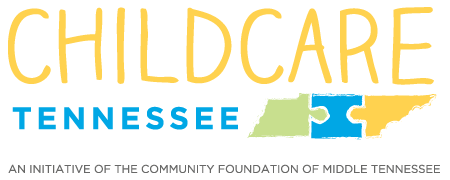
The Child Care Alliance of Middle Tennessee (CCAMT) Fund was established to expand affordable, high-quality child care options for children birth to kindergarten.
The CCAMT works to meet an urgent and growing need in Middle Tennessee for systemic child care solutions that help all families – irrespective of their economic status, geographic location, and access to transportation – obtain access to affordable, high-quality child care options.
The CCAMT Fund strengthens the child care ecosystem in Middle Tennessee by directing resources to three major areas of work:
1) Incubating new child care programs and supporting existing child care providers with business solutions, program establishment and improvement, and curriculum design
2) Collecting and using real-time data to effectively direct resources to child care providers
3) Exploring financing and policy solutions that ensure all families have access to affordable, high-quality care, and child care providers have the capacity, resources and support necessary to succeed
Why CCAMT
The Research
Neuroscience has consistently shown that the first five years of a child’s life are the most important years of brain development.
During the first five years, children’s brains are in a rapid phase of construction. Learning begins at birth, and by the time a child turns 5, the architecture of the brain is fully formed. The brain’s ability to adapt and change decreases with time. Healthy interactions and intentionally designed early learning experiences ensure children grow into strong, smart, happy, and productive students and adults.
The research shows high-quality child care is a necessity, not a luxury.
Business Challenges
This is a systemic challenge: Most child care providers, whether they are home-based or center-based, are small businesses struggling to stay afloat and to pay educators livable wages that match their peers in Head Start and pre-K programs.
The pandemic aggravated an already struggling small-business marketplace due to declining enrollment, additional health and safety expenses, and protections for child care staff wages and working conditions.
Child care remains expensive: State subsidies, private funding, and tuition for the vast majority of parents cannot make up the difference for the costs to run a profitable program. The current model does not work for most providers without major adjustments. Additional staff benefits such as growing wages and health benefits put the cost of child care out of the reach of families and owners of child care providers.

Families’ sacrifices
The average cost for adequate child care is an average of $9,017 for center-based care and up to $27,000 for full-time nanny care. That eats up a large percentage of a middle-class family’s income.
These challenges create impossible choices for families. Women bear the brunt of the burden by being involuntarily forced out of the workforce because there is no affordable child care option.
Economic destabilization
These challenges result in a significant loss of income for families, businesses, and our communities. In Nashville alone, $235 million is lost annually because of the child care crisis.
National economic research shows the value of investing in early childhood education. See the latest Nashville report from Tennesseans for Quality Early Education.

What We Do
The CCMAT Fund provides solutions for Nashville and Middle Tennessee’s child care providers and families. Our goal is to increase parents’ access to affordable, high-quality care for their children.
Expanding child care in Nashville and surrounding areas
More than half of Nashville is a child care desert, which means families need more accessible options than are currently available in the communities where they live and work, with operating hours that meet families’ schedules.
The Fund will help new and existing providers expand their enrollment capacity and reach by connecting them with resources, agencies, and provider-partners. Examples of this are adding satellite centers in schools or partner programs, establishing home-based programs for infants and toddlers, and partnering with an employer to establish a new child care center onsite.
The CCAMT Fund will also work with providers and partners to help providers navigate state regulatory and licensing processes, hire and train staff, choose effective early childhood education curriculum, and support high-quality early learning environments.
Creating profitable and sustainable child care
High-quality child care is expensive because it is a staff-centric business, and rules regarding ratios and other regulations require adequate resources. Public funding does not subsidize child care adequately, and neither parents nor providers can make up for the lack of funding and infrastructure.
The No. 1 factor in quality programming is the teacher. Staff costs compose about 80%-90% of a child care provider’s budget. Currently, early childhood educators take home an average of $27,000, roughly double the poverty rate, compared to an average of $40,000 for Head Start teachers and $45,000 for public school pre-K providers.
The CCAMT Fund works with providers and partners to maximize what is referred to as the “Iron Triangle” in child care. We offer direct support for providers, as well as partnerships with existing providers for mentorship for ongoing support.
The Fund will work with partners to maximize revenues and minimize costs, whether through automation of front- and back-office functions, protocols to maximize enrollment and tuition collection, and developing partnerships with existing providers to create economies of scale, often referred to as shared services.
Who We Are
Advisory Committee
Lynne T. Ingram
Joy Boyd Longnecker
Sara Diehl Naylor
Erika Ward
Lisa Wiltshire
Kinika Young







